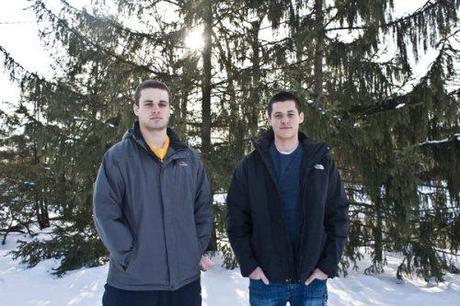
Schnepf (l) and Moilinari (r)/NY Times Photo
NY Times: One evening last month, the night before a blizzard that threatened the Northeast with a lot of bluster, two young men in central New Jersey decided to take action. Armed with about 100 fliers, Matt Molinari and Eric Schnepf, both 18 and seniors at Bridgewater-Raritan High School, went door to door in Bridgewater and then headed to Bound Brook, a neighboring town of about 10,000, to offer snow-shoveling services for a reasonable price the following day.
The ensuing combination of neighborhood vigilance, community policing, social media, local and national news coverage, libertarian ideology and the New Jersey Legislature swirled into an unexpected narrative about small-town living, or media fishbowls, or perhaps snowstorms.
After handing out about 40 fliers with their names and cellphone numbers, around 5:45 p.m. on Jan. 27, the two teenagers were stopped by police officers responding to a call that some suspicious characters were traipsing through yards, going door to door. Mr. Molinari and Mr. Schnepf met the description and were told that soliciting without a permit was “technically illegal” according to a town ordinance, Mr. Molinari said. They were also violating the town’s travel ban, which had gone into effect at 5 p.m. The teenagers were not charged, or given a written citation.
“We weren’t trying to break the law, and we only knew about the state travel ban at 11 p.m.,” Mr. Molinari said.
Solicitation permits in the town can cost up to $200, and are valid for a year. Nonprofit groups are exempt from the fee but still have to apply for a permit before going door to door. The ordinance does not apply to political campaigns, volunteer firefighters or real estate and insurance salesmen who have state licenses.
The officers told the snow shovelers to go home because the roads were not safe and said the teenagers could come back the next day if their services had been requested. The snowfall did not live up to its billing, and so they got only two requests for shoveling, and made about $50 each.
Mike Bal, a town resident whose home the boys visited, saw the police stop the shovelers. After hearing the boys’ account of the police encounter, he took to the “Bound Brook NJ Events” Facebook page, a town-affiliated forum, to express his outrage.
“Are you kidding me? Our generation does nothing but complain about his generation being lazy and not working for their money,” Mr. Bal wrote on the page. “Here’s a couple kids who take the time to print up flyers, walk door to door in the snow and then shovel snow for some spending money. And someone calls the cops and they’re told to stop?”
Josh Schroeder, who runs the Facebook page, posted the boys’ flier, because he “wanted to help them make money.” Both posts “went viral,” he said.
News media vans descended on the town; Glenn Beck talked about it, calling the situation a confrontation between young American entrepreneurship and the limits of an overly bureaucratic government.
Since the two shovelers had put their cellphone numbers on the flier, which had been published in USA Today along with an article (the flier has since been removed), Mr. Molinari and Mr. Schnepf kept their phones off for a while, they said, because they were getting hundreds of texts and calls from people who wanted to express their support or hire them for snow removal.
“It was meant to be a good deed,” Mr. Schroeder said of posting the flier on Facebook.
He said other news media outlets had skewed the story: “They twisted this into an antipolice thing,” he said. “It wasn’t the police’s fault — they were just doing their job.”
Michael Jannone, chief of the Bound Brook Police Department, said the verbal attacks on his department from outraged people across the country had been “vicious.” “We’ve been called everything from fascists to Nazis to Gestapo,” Chief Jannone said. “Our officers were never going to give them a ticket for that,” he added. “I can’t even count the number of times I’ve paid $5 for a cup of lemonade from a lemonade stand — I didn’t tell those kids to get a permit either.”
Chief Jannone said the danger from the storm was real: About three minutes after the officers had left the shovelers, their patrol car slid in the snow into a telephone pole, causing $11,000 worth of damage.
He also worried about the situation’s effect on community policing: “There are already disheartening relations between communities and police around the country, and then you have something like this. It doesn’t help.”
State Assemblyman Michael Doherty, a Republican whose district includes Bound Brook and Bridgewater, said he thought the law “sends young people the wrong message” when it came to hard work and entrepreneurship. “People have been shoveling snow for their neighbors for decades, if not a few hundred years,” he said in a telephone interview. “A law like this just shows how overbearing government can be.”
So Mr. Doherty brought a bill before the Assembly this month, which stipulates that ordinances related to soliciting would not apply to snow-shoveling services offered within 24 hours of a predicted snowstorm. In a statement about the bill, Mr. Doherty said, “We shouldn’t let government criminalize harmless childhood activities that were once rites of passage for tens of millions of American kids.”
Mr. Doherty is a frequent critic of Gov. Chris Christie, a fellow Republican, on policy issues — “I’m probably his No. 1 critic that speaks publicly,” Mr. Doherty said — but he said he thought Mr. Christie would support something like this. Mr. Christie’s office did not respond to requests for comment.
On Tuesday, the teenagers had another snow day and got back in business, shoveling about four inches of snow from two houses. One of the houses where they had cleared snow, a two-story, light-blue home, belonged to Daphne Ruben, a special-education teacher at their high school. By the late afternoon, the driveway and sidewalks in front of the house were clear.
Ms. Ruben said she had heard about the teenagers’ encounter with the law from another teacher. And on this morning, she said, she phoned Mr. Molinari at 8:30 to ask if she could hire the duo. Her husband had recently had surgery, and she could not shovel the snow herself. She said she paid the two, who used shovels and snow blowers, with a check for $50, and gave them hot chocolate and chocolate-chip cookies before they left for baseball practice.
The police were not involved.

DCG

